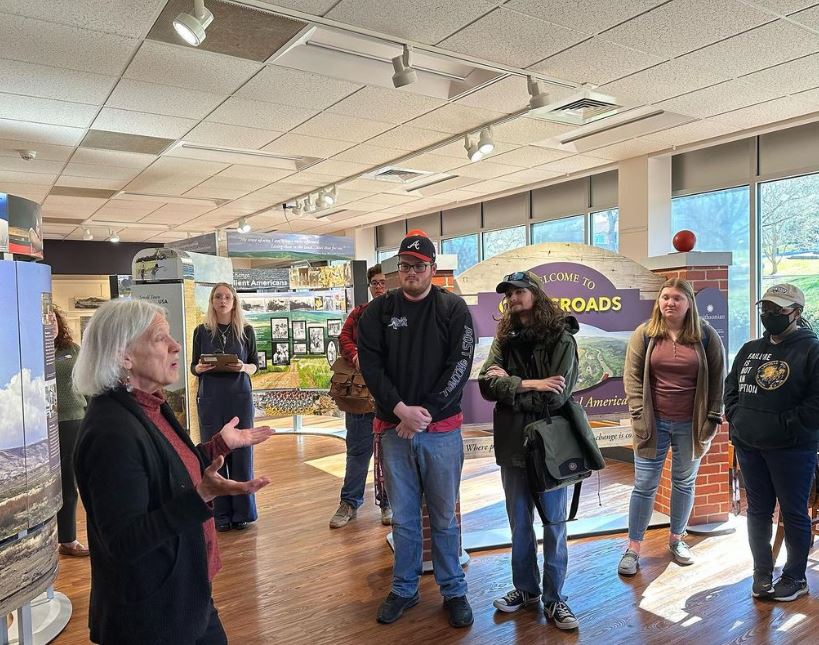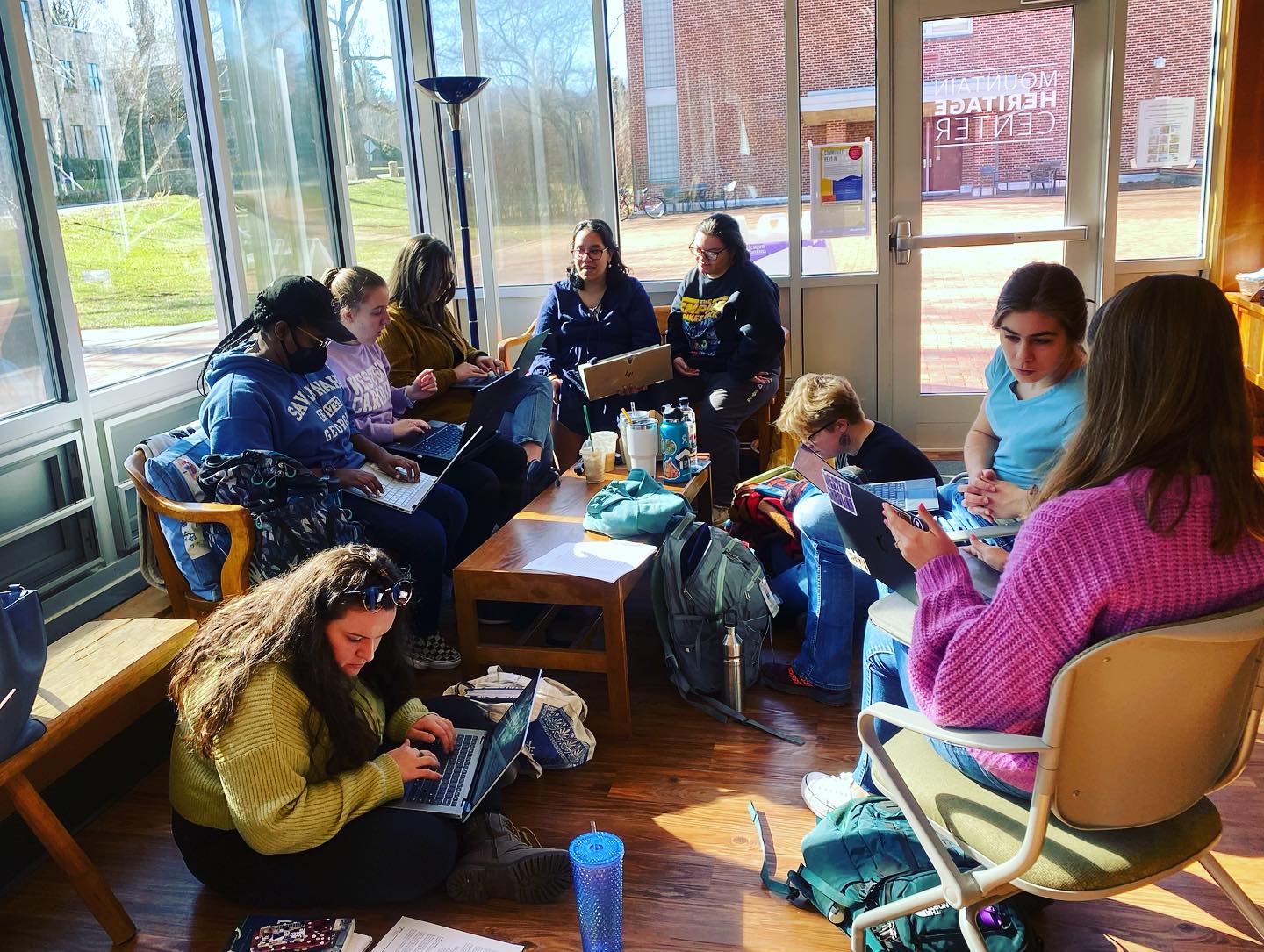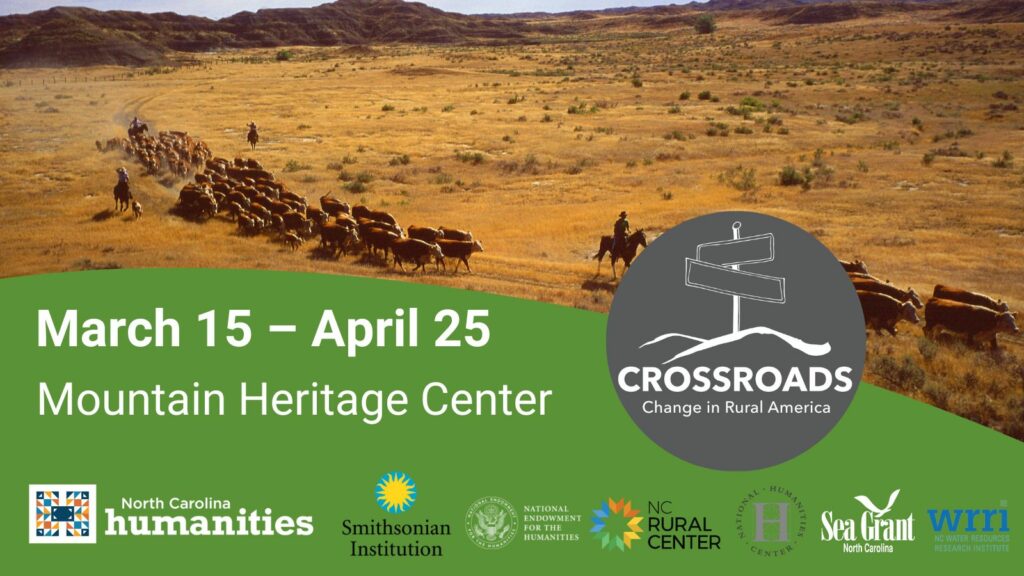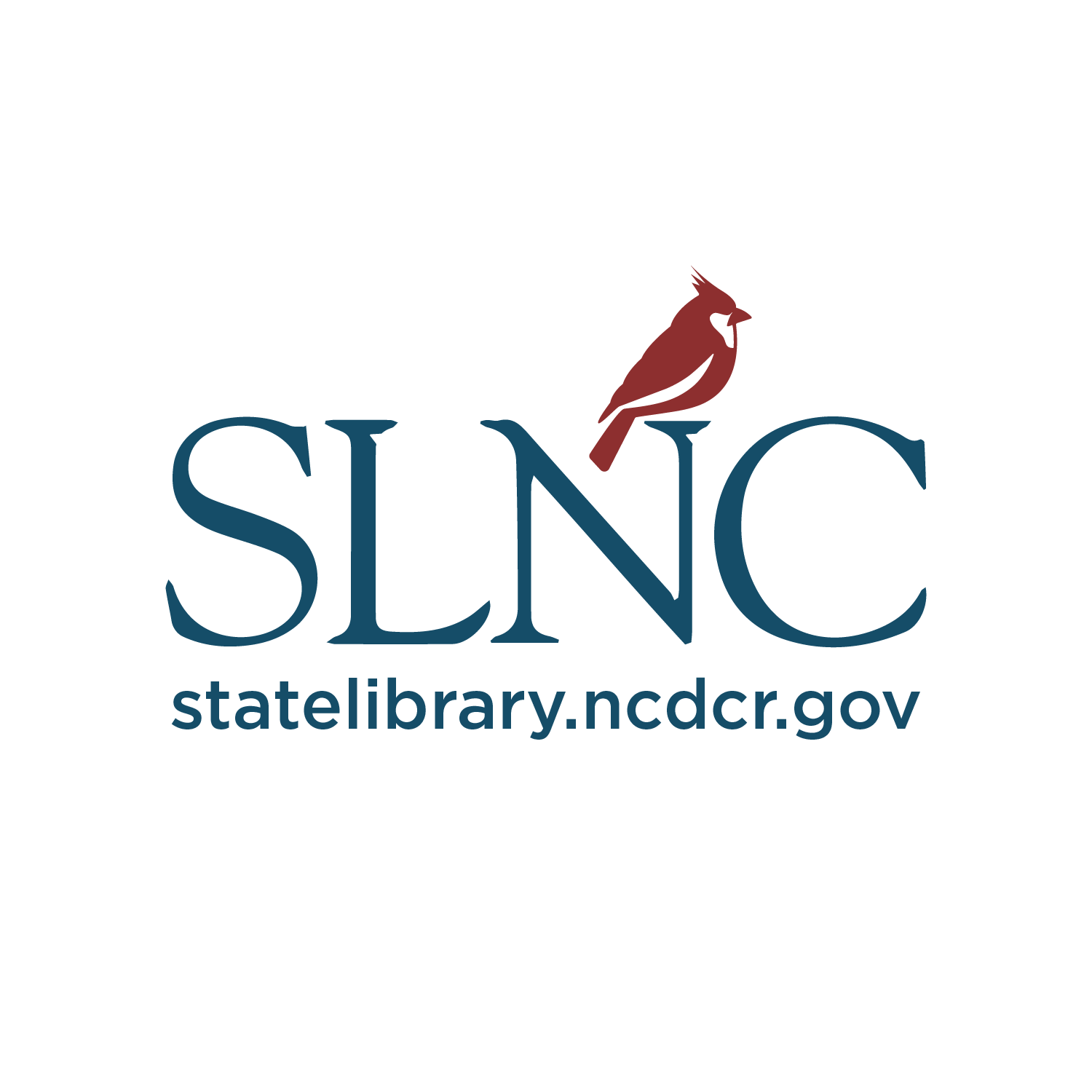(March 21, 2023) CHARLOTTE, N.C. –North Carolina Humanities is proud to present the Smithsonian Institution exhibition Crossroads: Change in Rural America! The exhibit explores the history of rural America and how rural communities are leveraging their cultural uniqueness as an opportunity for growth and development.
Six venues were selected by NC Humanities to host the exhibit around North Carolina in 2022-2023. As the exhibit travels, we are speaking with team members from each upcoming tour stop to discuss rural North Carolina and what visitors can expect to experience.
Crossroads: Change in Rural America is on display at the Mountain Heritage Center at Western Carolina University in Cullowhee, North Carolina from March 15 – April 25, 2023, Monday-Friday 10AM- 4PM, and is free and open to the public. To learn more about how to visit the exhibit and attend related events and programs in Cullowhee, visit: http://mhc.wcu.edu.
We connected with Peter Koch, education associate at the Mountain Heritage Center at Western Carolina University, to learn more.
 Tell us about the Mountain Heritage Center.
Tell us about the Mountain Heritage Center.
Peter: The museum was developed in the 1970s and highlights the history and culture of western North Carolina and different aspects of Mountain life and Mountain culture. We see ourselves as a bridge between the community and the university. We have two main exhibit galleries here. Our permanent exhibit features western North Carolina. Our thrust is asking the question, “is the region unique?” We try to answer that question with artifacts, images, discussion points, and questions. The other exhibit space we have changes regularly. Last year, for example, we had a big exhibit on regional quilts, some going back into the late 1800s, and some that were created as recently as the 1960s and ’70s. After that, we hosted a national traveling exhibit, Away from Home, that looked at a Native American boarding school story. So, there’s a variety of stuff going on here, and I think the idea of changing things works well for our local and university population. The students are always changing, and residents are glad to see we’ve got something new going on. We also work with Jackson County Public Library and the visitor center on I-26 when you head north from Asheville and we’ve got several traveling exhibits on a variety of topics like river cane, Cherokee crafts, and Plott Hounds, the state dog. We have many offerings to try and serve the region and the state.
What can people expect to experience when they visit Crossroads in Cullowhee?
Peter: We’ve been pleased to host several Museum on Main Street exhibits that NC Humanities has brought to the state. We hosted Journey Stories in 2012 and later, The Way We Worked in 2018. We like the way Crossroads: Change in Rural America looks, and it draws some interesting conclusions. Crossroads will be here during the spring semester and the K-12 visiting season, so we will be hosting several programs and having our students heavily involved with companion exhibits and projects. On April 18 we’re helping WCU’s Public Policy Institute host a non-profit round table here on campus. Right after the exhibit leaves, on April 28, we’re having a scholar from Duke, Anne Mitchell Whisnant, come to talk about her research on African American communities along the Blue Ridge Parkway corridor at Jackson County Public Library. Also at the library will be several companion exhibits that a museum studies class are putting together. They picked topics like healthcare, the railroad, logging, dance, music, and agriculture and are exploring what each mean to the region, historically and currently. Healthcare is a huge issue in rural America and in western North Carolina especially. Mountain agriculture has always been tenuous, but it was the real basis of survival for many folks. Over time, it transitioned from self-sustaining agriculture to more cash crop agriculture, like tobacco and apples and then especially Christmas trees. Crossroads will help us learn about where we’ve been and where we are going.
 “Rural” means something different depending on where you are in North Carolina. What does “rural” mean to you?
“Rural” means something different depending on where you are in North Carolina. What does “rural” mean to you?
Peter: To me, it means being removed. It takes a while to get to Asheville, it takes a little bit to get down to Atlanta, and for many that’s a positive. A negative is that we don’t always have the services in rural America that I think people may have in larger cities. One example is broadband and internet connectivity. That was brought completely into focus by COVID, and having kids not be able to go to school, and having people not connected remotely as well to their jobs. To help answer “What is rural?” we will have a student-led social media campaign. We have several students who work at the Mountain Heritage Center that will go out and interview their friends about living in a rural area. Follow us on Instagram (@wcu_mhc) to see the results!
How can people support the Mountain Heritage Center?
Peter: Come see us! Learn more by visiting our website: http://mhc.wcu.edu.
At the Crossroads: Exploring Rural America Blog: As Crossroads: Change in Rural America travels around the state, North Carolina Humanities is speaking with each selected venue to talk about rural North Carolina and what their visitors can expect to experience. Crossroads: Change in Rural America is part of Museum on Main Street (MoMS), a unique collaboration between the Smithsonian Institution Traveling Exhibition Service (SITES), state humanities councils across the nation (like North Carolina Humanities), and local exhibit host institutions. To learn more, visit nchumanities.org.
About the Crossroads tour: North Carolina Humanities’ tour of Crossroads: Change in Rural America began at Iredell Museums in Statesville September 2022. From there, the exhibit moved to Joyner Library at East Carolina University in Greenville, Granville County Historical Society and Museum in Oxford, and Museum of the Albemarle in Elizabeth City. The exhibit is currently on view at the Mountain Heritage Center at Western Carolina University in Cullowhee. The tour concludes at Onslow County Museum in Richlands June 2023. Thank you to our statewide tour sponsors: the NC Rural Center, the National Humanities Center, North Carolina Sea Grant, and NC Water Resources Research Institute, as well as the many local sponsors supporting the exhibit in their community. A full tour itinerary is available at nchumanities.org.
This interview has been edited for length and clarity.
Photo Credits: Mountain Heritage Center









